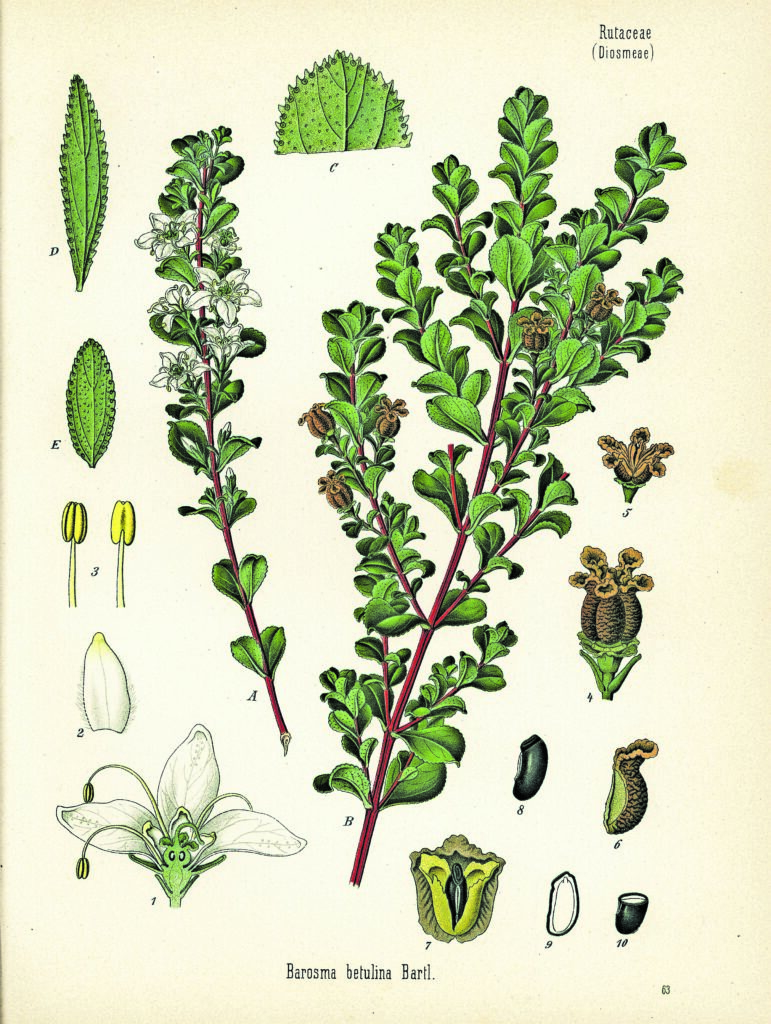Natural gifts: Buchu or Agathosma
betulina has been popular in
teas and perfumes internationally
ever since it was introduced to Cape settlers. (Photo by David Cheskin - PA Images/PA Images via Getty Images)
The well-known indigenous plant buchu is about to become a lot more popular after new laboratory findings at Stellenbosch University recognised the healing properties of the herb.
Buchu (Agathosma betulina and A crenulata) is endemic to the Cape Floral Region of the Western Cape. Indigenous people knew the healing properties of the plant and used it to treat inflammation, bladder infections and pain. The fynbos plant was introduced to Cape settlers in the 16th century before rising to prominence in the US and Europe in perfumes and high-end teas.
The latest published and peer-reviewed research by Patrick Bouic and Barbara Huisamen has unlocked evidence of its potential in assisting with the treatments of some lifestyle diseases such as diabetes and hypertension.
Bouic said the latest research supports a mass of anecdotal evidence from people who regularly used a buchu extract in the form of tea or infusions. He believed a clinical study would confirm what had until now only been anecdotal evidence.
 An illustration from Hermann Adolph Koehler’s ‘Medicinal Plants’, published in Germany in 1887. ©Florilegius/Leemage (Photo by leemage / Leemage via AFP)
An illustration from Hermann Adolph Koehler’s ‘Medicinal Plants’, published in Germany in 1887. ©Florilegius/Leemage (Photo by leemage / Leemage via AFP)
Bouic and Huisamen’s study not only showed the plant’s effectiveness in reducing blood sugar in rats but also showed promising results in reversing the effect of metabolic syndromes such as obesity, diabetes, raised cholesterol and hypertension.
“These are all long-term health conditions that are difficult to overcome, and to have some assistance that is easy to include in your day-to-day life is a fantastic development,” Bouic said.
“First, while the rats were still alive, definitely the hypertension, the blood pressure normalised. In other words by just feeding the rats a normal diet but adding the buchu water to the daily feed they started normalising their blood pressure to normal levels of non-obese rats. That was a significant finding,” said Bouic.
The researchers found that fat deposits also decreased. Bouic said the rat model confirmed the anecdotal testimonials from people who used the buchu water and reported losing fat deposits, lowering blood sugar and high blood pressure.
After inducing diabetes in the rats, the researchers also found that the rats had developed cells that actively secrete insulin .
“What we found was that [among] the rats treated with the buchu water it suddenly seemed like the pancreatic cells developed into active insulin secreting cells. That was really impressive because it means you can reverse a diabetic state by introducing the differentiation of insulin secreting cells in the pancreas,” Bouic explained.
Bouic, who has specialised in buchu research for more than 20 years, said evidence suggested the herb was most effective in diabetics who have not yet progressed to insulin injections; it prevents the progression of the disease. “What we are seeing is the alignment of today’s science with medicinal knowledge of the San and Khoi people who first introduced buchu as a medicinal plant to Westerners in the 1700s. Thanks to our scientific advances, we can now understand more about the ways buchu works on the cellular level, and how it can assist us in the management of some of the most troubling health conditions affecting our country.”
The research was supported by Cape Kingdom Nutraceuticals, which produces buchu products. The company entered into a benefit-sharing agreement with the South African San Council and the National Khoisan Council in 2013.
“This is an acknowledgement of the wealth of knowledge that was gleaned from the San and Khoi, who introduced buchu and its various medicinal benefits to the world,” the company said.
Under the deal the two councils receive 3% of the buchu product sales. The Protection, Promotion, Development and Management of Indigenous Knowledge Act sets the conditions under which indigenous knowledge can be used.